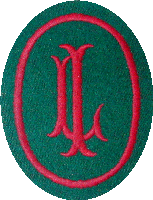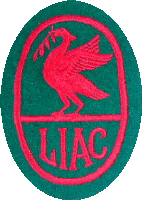Hockey Photos
- 1948 2nd XI
- 1958 2nd XI
- 1966 1st XI
- 1969/70
- 1972/73
1948 1st XIPlace your cursor over a face to display a name. 
Photo provided by Ian Heatley's granddaughter - Olivia Heatley
Front row (left to right): |
1948 2nd XIPlace your cursor over a face to display a name. 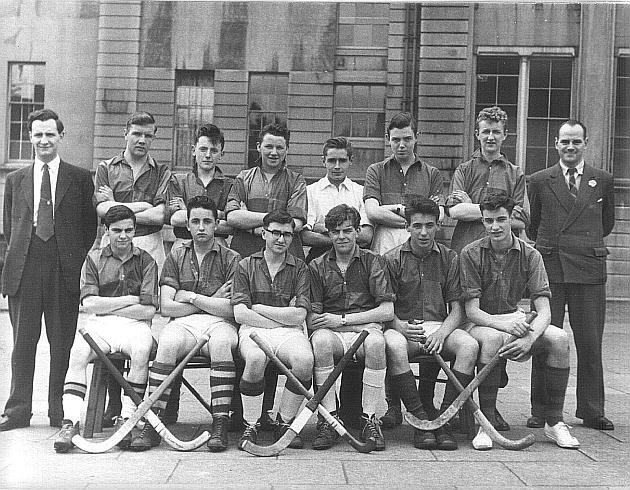
Front row (left to right): Photo provided by Ken AshcroftKen Ashcroft writes:EVERYTHING was organised by Arnie Cummins (glasses). There was no such thing as a fixture list, it was more of a bush telegraph thing - Arnie would somehow find us on Friday, and say, "9 o'clock at Mersey Road", or "7:30 at Central Station." Of course, all bus and train fares were self-financed. I think we played some men's teams, too, as well as boys. It was all very impromptu. Several of us had no idea what the game was about - I'd never even seen it played - Arnie explained briefly on the first morning. Training sessions? Yerwo? Close inspection shows that, not only are there insufficient jerseys to go round, the ones we have do not all match - some have the squares reversed. Socks and boots don't match either, and all the sticks are of pre-war vintage, save that of the captain. I only helped Arnie because he was such a cuddly teddy-bear-type chap, and I had mornings free on Saturday before playing Rugby League for Old Swan. Funny thing was, I abandoned rugby a couple of years later, but continued with hockey for another two decades. Can't even remember all the names - Eddie Butler - grinning, back row. Met him playing for West Derby years later. Ronnie McDade - ace Mathematician, became a teacher or perhaps even a professor somewhere. The lad at front left ( tough little nut), was a super nice guy called Harry Spencer, we were both in Nicky's class. (Also used to go on long bike rides together - him on his fancy Claud Butler.) We parted company in 1958, me for first year at Liverpool, he to the lab at British Enka. His study habits flourished as mine atrophied. We were reunited when he got direct entry to second year chemistry, where he outperformed me by a mile. Ended up with a Ph.D., then went to Saskatchewan, and I've never heard of him since. The two teachers, Wray and Axon, were total strangers to me, and they vanished again as soon as the camera shutter clicked. All jolly fun but I can't remember anything about the games. (Did the results really count in the grand scheme of things?) Often wonder what happened to Arnie. Being the kind of chap he was, he's probably President of Oxfam by now! Dave Brown writes:The Dave Baron in the second XI photograph isn't in fact Dave Baron, who was in the first XI, but me David Brown at the start of my hockey career. Later playing for Lancashire Boys and then Derbyshire and Yorkshire County Hockey. In the white shirt is Ken Donally. The white shirt is not because of a shortage but he was a volunteer occasional keeper. |
1966 1st XIPlace your cursor over a face to display a name. 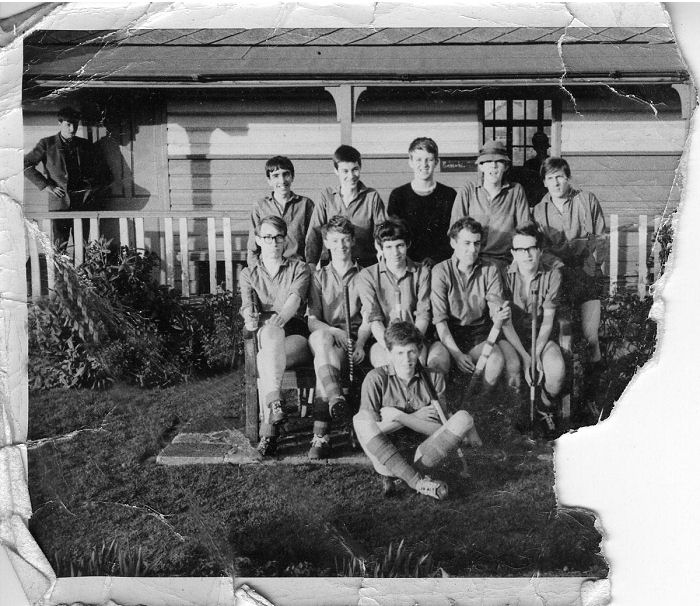
Dave Hadley - Steve Williams - Mike Ainsworth - Garth Prince - Phil Jones Ian Thomas, Captain Photo provided by Billy MortonBilly Morton writes:"I recently attended a dinner at Liverpool Cricket Club for the Pelicans, originally a Sunday hockey side formed by John Grace in our last year at School. One attender was Phil Jones, who played at inside left at School in 1966-67 and is now a GP in the area around Alder Hey Hospital. He also played for Liverpool Sefton HC for most of the six sides which we ran when I was a playing member. However, when he was at School, he was a bit of a sloth and sagged School quite a lot, to such an extent that he was banned from playing hockey until his attendance improved. At the dinner in October he produced this rather worn photo of the first XI in 1966-67 and has scanned and sent me a copy, together with these very helpful "cameos" of the individual members. I used to go and watch them on Saturday mornings, when they played on the pitches below the railway lines at Liverpool CC. The master in charge was a man called Jeremy something. They had some boys with a lot of basic talent (Phil included), but little or no idea of how to play as a side. One week at the start of the second term, Ian Thomas asked me if I would give them a tactics session at the School one evening, so I went along and in the gym, outlined some basics of the game, how and who they were supposed to mark the opposition and how to modify these tactics when they played a school with outstanding players, such as those in the imminent fixture with Calday Grange, who boasted about four Schoolboy internationals. This proved sufficiently effective for the side to draw with Calday the following Saturday, much to the chagrin of Peter Cross their hockey master. This single success bred such confidence in the side that I don't think that they lost another game for the remainder of the season. I'm afraid, however, that Jeremy disapproved somewhat of my enthusiastic (and very vocal) support from the touchline and wrote to me and requested that I ceased to attend the matches. Of this side, as Phil's comments relate, Stan Spencer played for Lancashire and Mike Ainsworth won a blue in his first year at Oxford. Several of the rest subsequently played for first teams at University and locally on Merseyside." Phil Jones writes:Standing in the background on the left is Dave Jones who had been the goalkeeper in the side for most of the season although he was probably only in the Lower V. A prodigious goalkeeping talent he kept goal for at least the next two seasons.
|
1969/70 1st XIPlace your cursor over a face to display a name. 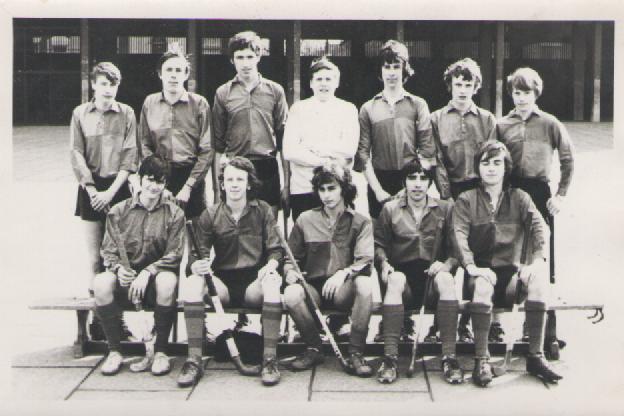
8 - Steve Kenny - Dave Blaquiere - Dave McKitterick - Ian Pearson Photo provided by Ian Pearson |
1972/73Place your cursor over a face to display a name. 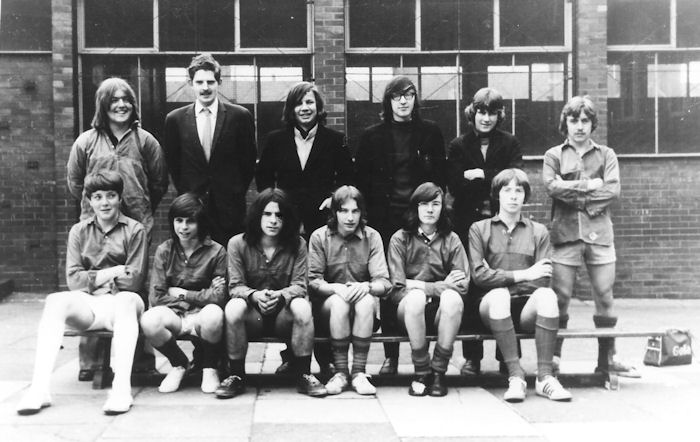
Mark Duffy - 8 - 9 - 10 - 11 - 12 Photo provided by Mark Duffy |

